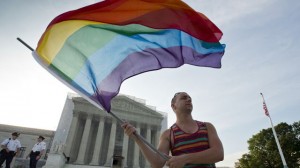In the first of two moves widely considered to be landmark decisions towards the advancement of same-sex marriage and civil liberties for gay people, the Supreme Court of the United States (SCOTUS) has just recently ruled against Section 3 of the Defense of Marriage Act (DOMA) of 1996. This section defines marriage as fundamentally between a man and a woman as seen below:
In determining the meaning of any Act of Congress, or of any ruling, regulation, or interpretation of the various administrative bureaus and agencies of the United States, the word ‘marriage’ means only a legal union between one man and one woman as husband and wife, and the word ‘spouse’ refers only to a person of the opposite sex who is a husband or a wife.
The decision by the SCOTUS to rule against the DOMA was a split decision, 5-4, with Justice Anthony Kennedy providing the swing vote against it. According to Kennedy, the DOMA was unconstitutional because it deprived citizens of “equal liberty” before the law. “DOMA writes inequality into the entire United States Code”, he added.
| SUPPORT INDEPENDENT SOCIAL COMMENTARY! Subscribe to our Substack community GRP Insider to receive by email our in-depth free weekly newsletter. Subscribe to our Substack newsletter, GRP Insider! Learn more |
The other ruling made by the SCOTUS involves the state of California and Proposition 8. Proposition 8 was a California ballot proposition and a state constitutional amendment to the California Constitution, which stated that “only marriage between a man and a woman is valid and recognized in California.” The difference with the DOMA ruling, however, is that the opinion written by Chief Justice John Roberts is based on technical grounds and procedural lines, and not much about how the court ruled on its merits.
The Ninth U.S. Circuit Court of Appeals, in San Francisco, had upheld a previous decision in Perry v. Schwarzenegger that Proposition 8 was unconstitutional. However, the supporters of the law did not have standing to appeal the federal district court ruling that struck it down, since the state government refused to defend it. Therefore, the case was dismissed. Once again, the decision was split 5-4.
Analysts note that the rulings stopped short of saying whether there is a federal constitutional right to same-sex marriage. Ultimately it is up to the individual states to determine whether same-sex marriage will be legal in each of them. As now, 12 out of 50 American states and the District of Columbia recognize it, and with California soon being added, it will become 13.
Can you imagine the scenario that was described above happening in the Philippines any time soon? Nope, neither can I.
Same-sex relationships, much less marriage, is one of those topics that remains taboo in a country like the Philippines that pretends to be liberal, yet is one still hopelessly bound to ancient and archaic institutions and traditions that have done nothing but bog it down. If one were to look at what the chattering classes have to say about same-sex relationships recently, it would most likely run something along the line of discussing the popular TV Series “My Husband’s Lover”.
“My Husband’s Lover” depicts the story of two male lovers who lead separate lives – one with a wife while hiding his secret from her, and the other living as a single, gay professional. Eventually, their lives meet again, and the married man’s life is taken for a ride. It is credited as the very first gay-themed series in Philippine television. Not surprisingly, it has attracted the attention of the Catholic Bishops’ Conference of the Philippines (CBCP), who said that TV networks should examine their shows closely for sensitive topics that could affect morality.
It is no secret that the Roman Catholic Church is one of the biggest obstacles to progress here in the Philippines. They have opposed population control, sex education, divorce, and same-sex marriage for the longest time. Instead of focusing on guiding Filipino spirituality, they insert themselves into political and secular affairs with impunity. Despite their slow and irreversible slide towards irrelevance, they are anything but silent.
If one wanted to simply cut through the bullshit, the Catholiban Brotherhood Conclave of the Philippines is simply telling TV networks to keep them relevant to society by showing only content that the CBCP approves. What kind of morality does one speak of, if instead of promoting discussion and exposing people to society’s issues and realities as early as possible, they sweep it under the rug and pretend it doesn’t exist? What kind of institution would you want to be a part of who tells you that people with “unnatural” conditions are inherently immoral and evil?
The CBCP shouldn’t be meddling in what are essentially political and secular affairs.
Generally, though, Filipinos also want to pretend that homosexuals/gays don’t exist but the fact is that they do. Even if they appear tolerant of them, when the backs are turned, the discrimination is sure to fly.
Actually, the image that Filipinos have of homosexuals/gays is markedly limited. Ask most of them to define a homosexual/gay, and they give you an image of the guy with make-up on who goes around wearing feminine clothing, and with a different voice and often loud, boorish way of speaking. It sounds like many Filipinos lump the stereotypical “bakla” and the homosexual/gay into a blanket image, and judge it. What many Filipinos don’t realize, however, is that many homosexuals/gays look and act like heterosexual people. The only difference is that their preference for a partner is one of their own kind, and it may not be obvious that that is so.
Church doctrine is strict that homosexuality is unacceptable to them; we’ll give them that. The question to ask here is: until when are we going to let the influence of the Roman Catholic Church of the Philippines get in the way of recognizing that gays here in the Philippines should have civil liberties like heterosexual couples? Civil liberties for gays is essentially a secular issue, and if Filipinos truly stand for a progressive, liberal society, they would do well to remember one thing: under the law, everyone should have equal rights.
Personally, however I feel about homosexuals and homosexuality, it shouldn’t get in the way of my treating them civilly, like any other human beings. That’s the core of it: take away all the labels we attach to people like homosexual, different, or gay, and underneath it we find people who only wish to be respected and to have the same rights like everyone else.
[NB: Parts of this article were lifted from the Wikipedia.org articles “Defense of Marriage Act” and “California Proposition 8” in accordance with the Creative Commons Attribution-ShareAlike 3.0 Unported License that governs usage of content made available in this site. Photo courtesy Fox News and GMA Network.]
А вы, друзья, как ни садитесь, все в музыканты не годитесь. – But you, my friends, however you sit, not all as musicians fit.


I have this gut feeling that “My Husband’s Lover” would perhaps end predictably, as all “third party” soaps do: the married man stays true to his spouse, while the third party (regardless of gender) suffers a less-than-desirable fate. All wrapped up neatly to appease prevailing Pinoy social mores.
Not really an improvement, if you ask me.
Our society’s mentality was pegged on the “machismo” way of thinking combined with the fear that God will burn you to hell if you are other than the opposite genders. They forgot or does not want to accept that being gay has nothing to do with gender but instead more of the reality of sexual preference and that being gay is not a choice which until now society does not want to accept as a natural phenomenon and that you are born to it. Welcome to the backward world of religion.
If whales were stars in the show, it’d be called My Husband’s Blubber.
Sorry, can’t help the humor. hehe
Well, I think I’d rather watch that show instead of a show that has a poor actor acting like a retard *cough*budoy*cough*.
And before anyone here accuses me of being gay, Im not.
I actually worked with the third sex during my brief stint as a call center agent and they were pleasant to work with.
I only dont like gays that are obnoxious twats(Im looking at YOU, Vice Ganda)
i knew id find you here because in the other article the topic was the new airport but you managed to include gay sex acts in the conversation.
if you read their decision text theres nothing to prevent a man marrying his dog now
I have doubts that this is a step against discrimination or violence against gays. I see that discrimination as more of a cultural thing rather than one of legislation. Anti-gay people can still go on a rage and riot, and will continue to defy the law and law enforcers to do what they feel is right. It’s really more of the culture thing, as in the beliefs and behavior of people.
@amity
TROLL. That wasn’t the point of my post.
AT ALL
You’re still not very smart are you, sendonggirl?
I hope this also gets implemented in our country because we are symphatetic to gays.
Ummm….Isn’t the CBCP Updating Filipino Spirituality right now by Fighting Secularism?
And that’s a good thing why exactly?
To be fair to the Benevolent Ayatollahs, some definitions of secularism tend to be…extremist (cf. French Reign of Terror, 1920’s-1940 Mexico).
somehow this will do the EXACT opposite of what it was designed to do, tricky those U.S. Sentors and Reps.are.watch ur wallett!
In the Christian religion and other religions. Same sex marriage is sin. However, in secular world, it is okay.
I am a traditionalist. I still believe in marriage, between a man and a woman. Whatever, your belief is: it is your business…
What are the comments of the Catholic Church, and other religions.
I am a traditionalist. I still believe in the marriage between a man and a woman….
“A man shall leave his father and mother, and shall cling to his wife. They shall be of one flesh, not two.”
I don’t get it. In fact, I could not really understand what is the point of same-sex marriage and gay rights. And in the Philippine setting, at that. I mean if you are gay in the Philippines you don’t get discriminated much more than each and every straight Filipino as it is.
It’s like this: in the Philippines we drive on the left side of the road. Then here you come with your RHD car. And now you ask the government to make you your own lane?